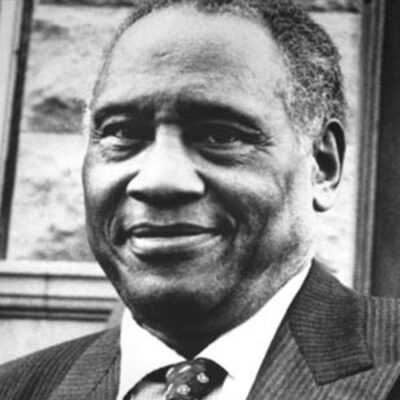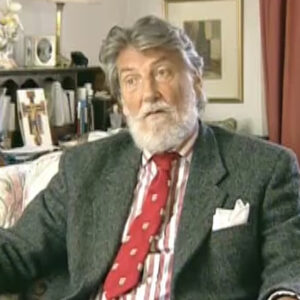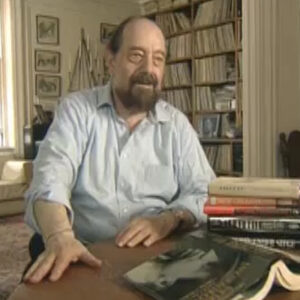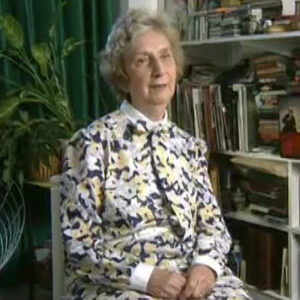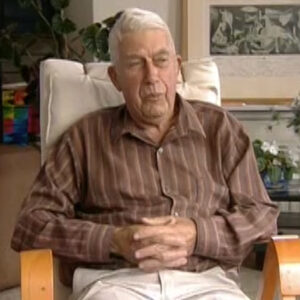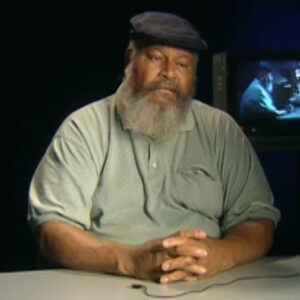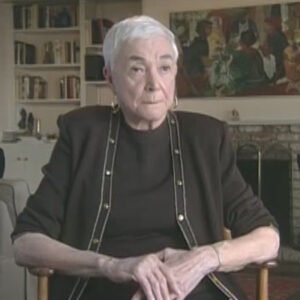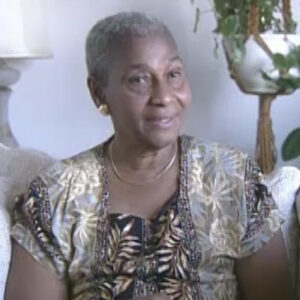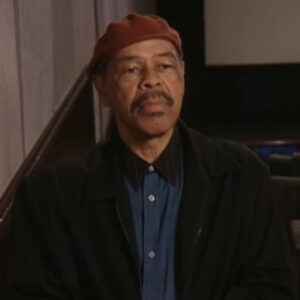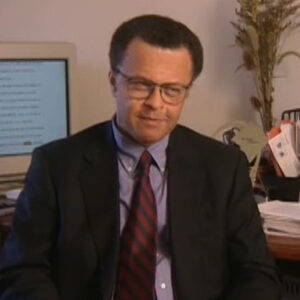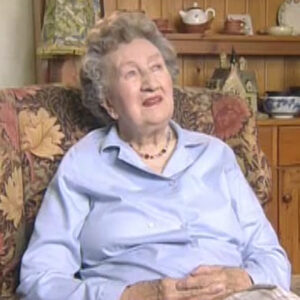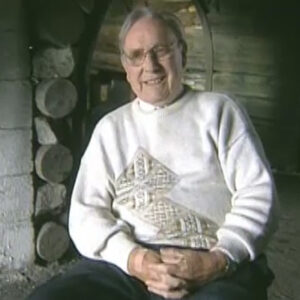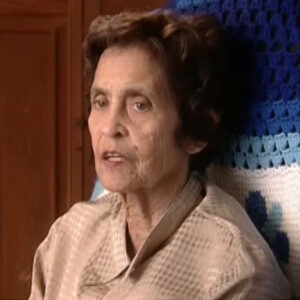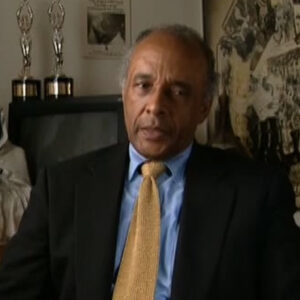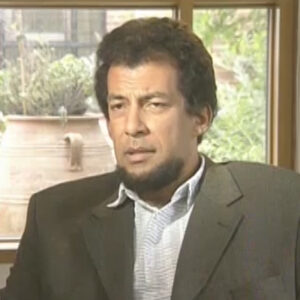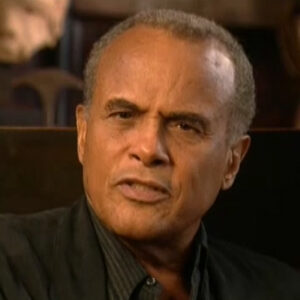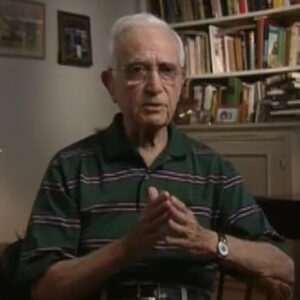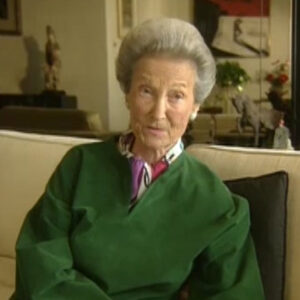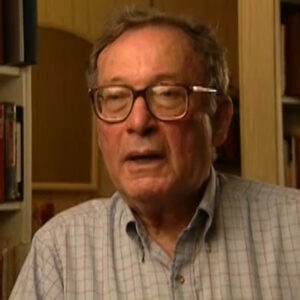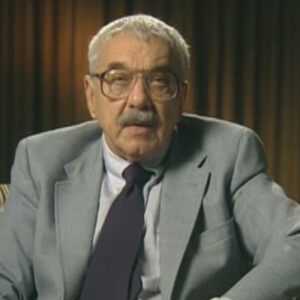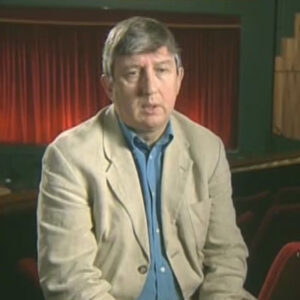Speaker About your experience that you work in the hospital here?
Speaker Yes, yes, I’m a retired chartered physiotherapist and I’m also a trained nurse specializing in orthopedics. And of course, after I qualified, I was trained actually at the Robert Jones and Agnes Hunt Hospital in Oswestry in Shropshire, as you were working two days a nurse in the hospital here.
Speaker Could you talk about the case with the workers or perhaps injured?
Speaker Yes. When my first job, after I qualified, I returned to South Wales to the valley where I was born and educated, the Ronder here. And I took up a post at the Post Cottage Hospital, which was one of the little hospitals in the valley that the miners themselves had built way back at the end of the 19th century because we had no hospitals early in when the mines were sunk in the beginning. And it was part of the workload, as it were, because there were numerous accidents going on, explosions at the collieries. And we had a wonderful surgeon and a physician in charge of the hospital. Mr. Bryant. And you always said that when he was called to a certain pit that if needed, that he would always take either a physiotherapist or a trained orthopaedic nursing sister with him so that they could help with the splinted so that the men could be brought from the pit, from the down underground to the surface in more or less safety, ready for him to perhaps perform surgery on them at the hospital. So I got accustomed to the pits and what it looked like at pit bottom.
Speaker What were the conditions like that you saw for workers? What year is this?
Speaker Well, I’m talking, of course, of 49, 48 and 49. Conditions by this time had improved greatly treacherous as they still were, but nothing compared with my childhood. Of course, I’m 73 years of age now, but as my childhood, I can remember when Paul Robeson first came to South Wales, the conditions were very, very different and they were really hazardous, dangerous. And as Paul Robeson’s own words were, it was slave labour all over again was in those days, all the pits in the valleys were owned privately. And the private owners, they were very ruthless and very, very greedy men. They were known to only interested in the money that they could get out of the men. And they were treated in the most appalling conditions. And I’ll give you one example. There was a disaster when I was a child in the colliery not very far from us in Perth and there on the valley. And when the reporters came up from Cardiff, from the newspaper department, and they wanted to report on this dreadful disaster, and then the coal owners and the bosses arrived in a car. And the first thing they asked, how many ponies or were there any pit ponies killed or damaged in the explosion? They never asked the first question. They never asked about the men. They asked about the pit ponies, as they had had to by the pit ponies, of course, but not the men. And that was the situation. And men worked underground. It was a common knowledge of us. Children say, oh, my dad works in the two foot nine or my dad works in the two foot six. Poor dad, you know, he’s very, very tired when he comes home to two four and the two foot nine was just the coalface where if you measure to foot nine, it’s about that high from the ground and they couldn’t stand up. Many of them had difficulty in even working in a kneeling position and the only tools they had was a pick and a shovel and their bare hands and they’d be stripped to the waist. There was no security for their bodies, as there is with the miners, the miners in the 50s, 60s, where they’d wear a helmet and protective gear. I mean, they had to cut it with a pick and there was one set of coal owners. I’ll give you an example where there was riots here in the valleys and it was all brought about. You known as the Tony Pandi riots. And that was all brought about because the coal owners brought in a rule and said they would only pay for the very, very large lumps of coal that was produced.
Speaker Well, no man can pick out a seam of coal without chippings and small coal going down and more than half or three quarters of what he would dig all night. All day four would be the small pieces, but they were only paid for the large pieces and the men, they came out in opposition to this and there was this massive strike and there were riots as a result of it.
Speaker OK.
Speaker Now, tell me, what were the conditions like when Paul Rose and. I came to know about the miners and how did he know about how did he come to the valley?
Speaker There was a leader of the miners. You see, this is long before the National Union of miners throughout the country. And they had their own organize organization. They were being organized together by certain people. But there was one man that stood out above all hours, all others in South Wales, and he was A.J. Cook, author, cook. And he had come up from the West Country. He was an Englishman and he had come to the valley to work in the pit. And he realised that the men needed some organizing because he could see that the coal owners were literally treading on them with their power. And, of course, that they had been asked the miners to work much, much longer hours for less pay. And this was a result following the riots that I had been speaking to was each time that they stood up and they complained about anything, they were punished later on by the owners of their own pit. And this man decided that he would try and organise the miners, and he did. And they had a slogan which was given to them by offer, not a penny off the pay and not an hour on the day. And the men would call this out. They would have mass meetings congregate on the mountain sides. And after they’d gone home from chapel, possibly on a Sunday, they would all go up the mountainside and have this meeting and told how to organise themselves for the rest of the week where the coal owners knowing about this, they blackleg, the whole lot of them, and they locked them out of the colliery and they said, if you’re going to object, you won’t work to our conditions. Well, you will not work at all. And they were blacklisted and they couldn’t get jobs. And of course, that’s the only industry that there was in the valleys of South Wales, coal mining. There was nothing else. They couldn’t just leave a pit and find a job elsewhere. There was nothing for them. So when you were locked out of your colliery and you had no job, A, you had no money, and B, you had no coal for your fireplace, and if there was no coal in the fireplace, you had no means whatsoever of cooking your food. And if there’s no money, you cannot buy food. And that was the situation in South Wales. Many, many families were on the verge of starvation and the Salvation Army and organisations outside Wales was trying to get food in as best they could. Our family, we were fortunate. We had an uncle who had a farm down in the veil of Glamorgan, and every week the horse and cart would come with about 100 feet of carrots, potatoes, onions, at least it was vegetables. And when it would arrive in our district in Perth, it would be distributed amongst everybody. My father wouldn’t have dreamt of my grandfather keeping it just for our own family. It was to be shared amongst them all. This is what we call Christian Socialism because we are our brother’s keeper. What about the way that Paul found out about the miners now locked out of their colonies and things were getting more difficult month by month, month by month, when you have no money and the children were growing and other children being born into the world, etc. and one group of miners, they were about 14 or 15 of them from the smaller valley in the Ronder from Ferndale, what St. Paul’s and travelled and travelogue. And they decided enough was enough and two of those miners had lost their own wives in childbirth, not because there was difficulty with the birth, but they were suffering from malnutrition and that’s how they died. And there was a tremendous amount of malnutrition here, not only with the miners, but with the wives and even some of the children. And this group said we’ve got nothing to lose. They’d lost their wives and lost their only child. That was to come into the world. Let’s walk. Let’s go all the way to London. They’ve got plenty up there. There’s an affluent society there. We’ve got nothing. We like a forgotten race. And they decided to walk all the way to London, the tremendous task they were taking on. But they were kind people en route. Farmers would put them in the barn at night or they be able to sleep in the hedgerow and they’d have possibly a glass of warm milk to set off in the morning. But they had no money, they had no money, and they just prayed as they went along that people would take notice of them. After six days, they arrived in London and somehow they found their way not. Very, very far away from a place called Drury Lane, and they happen to be a skater, they’re called the Drury Lane Theatre. They didn’t know Paul Robeson was in London. They’d had so much trouble on their minds and they couldn’t have afforded anyway to buy his records, to have listen to him. To many, he was an unknown name. To some, they just knew he was a wonderful Negro that had a wonderful voice.
Speaker They never thought they’d ever meet him, but they did because he was performing at the Drury Lane Theatre with the stage show of Showboat. And by this time, Paul Robeson was shopping and stopping the show every night, of course, with the singing of Old Man River. And he’d become the idol of the aristocracy. They absolutely adored him. That was on the stage. It was a different kettle of fish. In some instance when he came off the stage, of course, that was there were some nonsense with the upper classes even in London. But nevertheless, Paul had a wonderful, shall we say, 98 percent, gave him the most wonderful reception. And he was a superb artist taking London by storm. And he was there at the theatre on this very afternoon preparing possibly, I don’t know, for the evening performance. And these men had arrived in London near this area. They were very hungry. So what do miners be best at when they’re in a spot of trouble? Some of their inheritance is a good voice, a good singing voice, whether the hills and the mountains have done that. But they burst into song and they were singing Welsh hymns. This was in a language that Paul Robeson and some of the Londoners had never heard before, and they were going along the streets and they saw it as people were noticing them, they’d start and they all died caps that they wore, the little cloth cap. They called it a dike up, as David is a good first name, as you know. And they were rattling the dike up and 6000 pieces and pennies and shillings were dropping in the cap and they were achieving something. And at the same time, there was one or two people walking at the side trying to explain why they’d come to London. And one of the passers by, whether he had we never know any connection with the theatre or with Paul Robeson. But that man who heard them sing on the pavement, he went to the Drury Lane Theatre and he informed Mr Paul Robeson that there was a group of miners. He thought that they were singing in a language he didn’t understand and they had some bit of a chip on their shoulders about something that happened.
Speaker And they said, But anyway, Paul, never mind what’s happened, go and listen to their singing because it is magnificent. He said they’ve got some lovely voices.
Speaker And Paul Robeson went out to meet them. And Paul had the biggest shock of his life when he heard what they had done, had walked all the way to London without a good meal of food, just snippets and snippets there. And of course, Paul Robeson heard the whole sad story and he said this is like slave labour all over again. And he told them, he said, you know, my mother and father were escaped slaves. He said, and those were hard times. Little did I realize by coming to this country, he said, that I would see circumstances very similar or neat in a different way. And he listened to them. And then he said, well, the first important thing, and he took them for their first meal for days and he took them to a little restaurant. We believe it was one of the Lyons corner house cafeterias in London. But he certainly took them and provided them with a meal. And he had all the Djenne about all the problems and where because he didn’t even know there was a place called Wale’s, he was only thinking of London in those days and being the Centre for Entertainment and the Arts. And he promised that he said, look, you know, I can’t sort this out here, but because I’ve got an evening performance and Showboat was to run for quite some time. But he promised them there. And then he said the minutes that show boat finishes, I promise I will come down and I’ll come amongst you and see what I can possibly do to help. But now they had been taken by him with for a meal and he wanted to hear them sing. And apparently by this time after they’d had a meal, they would take him near Trafalgar Square by Paul Robeson and some of his colleagues. And Paul gave them what they say, a half a concert because he sang Old Man River for them because it had become his signature tune and the men sang for Paul. They sang Welsh hymns. And Paul Robeson told them, we said our Negro spirituals and you Welsh hymns. He said, they go hand in hand. We’ve got an understanding, he said, because it’s in times of trouble. He said that we burst in a better voice of Negro spirituals and he said, You do the same with your hymns. And that friendship was made that day in London. They had a bed for the night and when they went ready, they say good night to him.
Speaker He said, you will be on the train in the morning. You will not have to walk home. And by this time, of course, A.J. Cooke would be taken a senior post in London by this time. And of course, he came on the scene with Paul and they all organised that the men would come back in what was known as the milk train, because all the milk for the cafes and and the restaurants up in London usually came from the farms down here in West Wales, Carmarthen and the veil of Glamorgan. And it was known as the milk train. It used to go up in the evenings, but it would come back empty with the empty chair the next morning and the miners were put on the milk train to come back. And instead of putting many of the germs, there was only half amount of germs because one of the containers was filled with food shoes.
Speaker For children and for adults, especially the men’s heavy footwear, and it was filled to capacity to accompany the men back to South Wales, still recalls the way.
Speaker Was Oval Office a very, very tight.
Speaker The of course, Paul Robeson, by this time, if you read in the history books, he had not just come over and he had done a play in London before every did showboat. I mean, they all knew of him on the in the theater land in London. And he had befriended a lot of the radicals of this country, Bernard Shaw, Bertrand Russell, all the eminent people, you know, the professional radicals and people who were members of the Fabian Society. And and, of course, when they got to know this, because it herbed. Do you know the 24 hours that these miners were in London? I mean, it just went like a tornado. All this about what’s going on in South Wales and all the rest of it. So people now wanted to help. So the men that had walked the miners had really achieved their goal, hadn’t they? But even going there. But what a wonderful bonus. They had met the world’s famous Paul Robeson and not only said hello to them and autographed anything, it was a bond of friendship. And Paul Robeson kept his promise. And he did come to South Wales. It’s in 1928, by the way, that the miners it was in October, the last week of October 1928, when they walk to London. And Paul Robeson came down on his very first visit to South Wales at the beginning of 1929.
Speaker So what happened when he got there and what kind of reception but when he came to South Wales?
Speaker Well, now the thing is that he was met by the now present miners by 1929, isolated Arthur Cook, who had been their leader, and now go out with this capability of controlling and getting the miners organised. They asked him to control miners throughout the country and to be based in London. So, of course, he was in on the scene when they’d walk there to meet his department and the the government, I think that was intended. But they met Paul Robeson and said and that was more important to them, I think, of what materialized. But you see, with befriending these and other people, the contacts now is coming back and forth to London.
Speaker And there was a gentleman, the name of Orser Horner had taken over as controller here in South Wales, the secretary of the Miners Federation. And it was also Hauner that met Paul Robeson at Cardiff Station. And Paul travelled down itself, accompanied by I don’t know whether they two of his friends or whether there was one theatre assistant or who it was. But there were two other gentlemen who travelled with him. These two stayed in Cardiff. I don’t I haven’t their names. I’m sorry, but they stayed in Cardiff. And and but Paul was taken by Mr Arthur Horner and he was brought immediately into the run the valley. And it was the case that also Horner was making his home with my own uncle, Uncle Owen. And it was the question of come to see what’s going on in the valleys. And he said, look, I will take you to my where I’m sharing a residence until my own house was being built in Cardiff formed, which was to go with the post, you see. And when Paul went to visit my uncle and they realised the size of house, it could accommodate Paul and they’d welcome him. And he said he didn’t want to go to stay in a hotel. He stayed there and he saw the valley really from inside and out. He lived amongst the people.
Speaker It wasn’t just waving at a distance. He became part of it. He wanted to find out for himself of what these miners had told him and he wanted to help and then kind of liaison between South Wales and London. But Paul got involved when he came to South Wales because he admired so much of how the miners you see, they were such Christian men, they’d spend all the Sabbath at the chapel and they lived Christian lives from Monday to Saturday, inclusive. And they weren’t perhaps they were hard men of the type of job they did physically and had this strength. But they were such gentlemen when it came to the feeling of the heart. They were family men. They cared about their families. They cared about other people’s families. If they had a sixpence, they must share it with somebody who didn’t. And there was this wonderful Christian, what I call Christian socialism, going on, sharing one with another, sharing your problem, sharing the food, sharing your troubles, everything. And with the help of the chapel and there were more chapels than the Church of England. Of course, the chapels were more how can I say they were more socialistic in heart, more for the working man. And they took us under a wing between this education we were having at the schools, the day schools, what the chapels were doing.
Speaker And she was a further education for us and of course, what books we could get from the miners libraries because the miners had started their social life when they were working in the pit, was going to the library discussion groups, it was furthering their education, read, read, and they were determined that their children that were coming after them would do the same. So they were laying the seeds.
Speaker There was no money to buy them somehow.
Speaker It is, of course, some some families, perhaps the richer families might have had gramophones and but very few of the miners would have had a gramophone and been able to buy the records because, you know, the money was so small, it was such pittance of salary that it was all needed for food and some clothes for the children or for themselves.
Speaker The first operation was the first time you came. Was there any surprise in? So big and also black.
Speaker Oh, yes. Well, I personally was frightened by him because when he was taken to my uncle’s house, I didn’t know as a little girl. And my father was only aware that there was a meeting to be held. Even my own father, who was one of the officials of the lodges of the men, my even my father didn’t know that Paul Robeson had actually arrived in South Wales. We knew that he was going to come as soon as he could. But my father wasn’t aware there were no telephones in those days. You couldn’t contact one another. And there was so much going on that perhaps they wouldn’t even buy a newspaper because they were so active trying to organize things and trying to get some food and clothing to very needy families. And my father was going to a special meeting at my uncle’s house. It was quite a large house and one of the rooms on the ground floor had been converted into my uncle’s library. But he also used it as an office. And and when any of officials or somebody of importance came with the questions to be asked about the mining situation, etc., that they would all talk in private in this room, which would be separate from the rest of the house. And my father was attending one of these meetings and I was a little girl, along with my two older brothers, accompanied him because we liked going to visit my aunt and we would be entertained with his aunt and beautiful garden there while this private session would go on with the work for the mining social side of it and to help those in need. And I don’t know whether it was that I was helping my aunt, but she wanted to take something in, whether it was a tray of tea or something that my uncle wanted. And I accompanied my aunt and of course, on normal situations, it was when we visited my uncle, I’d always as the baby of the group, as my brothers were older, they’d have a handshake and a hand round the shoulder. But me being the little one, I had to kiss and a cuddle, didn’t I? And Uncle was a dear thing. We loved him very much because he had a wonderful sense of humor and we were always rewarded if we sang for him or recited because he’d always ask. He was interested if we’d done something special at school day school or what had we sang at Sunday school, which was the chapel in the afternoon. He always wanted to hear it and we’d have our reward because in his pocket, if we knew we were coming, there would be either a penny or a half penny for us to buy a bar of chocolate. And he was such a darling, he would have gone to the bank and he would have had one of the new minted ones, which were gold in and shiny. And he’d always say a sovereign or a half sovereigns, only the rich people and sovereigns of gold. But these were only havingness and we loved him for it. And that was what we’d have after our kiss and cuddle. But on this very day, as we knock the door, he went in with my aunt. I only got across the room with my uncle, was at his desk in the corner, and I usually trotted through and grabbed him and kiss and cuddle, sat on his knee usually. And I was halfway across the room and everything was so, so different to normal because there were people sitting there and one man in particular stood up.
Speaker And I had never, ever seen a true black man before, we had seen all our fathers and our uncles and grandfathers from coming from the pit, all black, but after they’d been home about 10 minutes, quarter of an hour, they would have watched at least they face and hands and they would have had white faces.
Speaker But this man was black and it was a different black. And the thing that frightened me most was I had never seen a giant before because here was this man. I found out as I got older, I was six foot, nearly six foot five in height, this great black man and I never went over to my uncle. I’d forgotten all about the kiss and the cuddle, not even pocket money. I ran for the door. And apparently, according to my my father and my aunt, I hid behind a grandfather clock that was in the hallway at the bottom of the stairs. And I just was so frightened. I just ran there to hide away from them all. But my father always had the greatest of pleasure in telling the story to every relatives that came to the house, whether he said funerals or weddings. And he would tell them then this wonderful man, he said, came out from Irwin’s office and he said in that lovely deep voice, my little one, I would never hurt you. And apparently I was picked up and I was taken back in the room and I sat on the arm of Paul Robeson’s chair. And from that moment on, he became my gentle giant.
Speaker And even now, all these years after his death, I still think of him with much, much love as my gentle giant. I was to follow Paul Robeson afterwards. Of course, I was only four and a half when all this happened and I had kisses and cuddles and hugs and I was asked to sing for him and I did. I sang for the great man. And of course, he made sure that I and other children in school, in my class, that they had little copies of words of little Negro songs or little African lullabies. And it was all through this very first meeting. And as I got older, of course, I was appreciative of what he stood for. And when he came back to do the film, I was in grammar school getting older, reading more about him, learning and listening to what my father, my grandfather and other people’s fathers were saying about this wonderful Paul Robeson. So you see from my childhood on that I have added year by year more knowledge about Paul Robeson. And the lovely thing about Paul was, never mind how small you were or how old you were. He not only performed for you and spoke to you, there was always something that was educational. At the end of it, you never just sang and said that was a song whether. But he’d give you a little talk. That was an African lullaby. And we would be told and we’d have a part of a little geography lesson about Africa and about the cultures of Africa. And so, you see, he he was our lecturer. He was one that excelled to extend our education. So you see, this is why we always remember him. It just didn’t come on the stage and sang and be cheered and disappear. He left a bit of him behind. And I think it’s the words of Sidney Poitier, his excellency, today, his Excellency Sidney Poitier. He said a little bit of Paul Robeson always rubbed off on those people who really got to know him. And I think it’s the case with me.
Speaker Did you, as you grew up and as you began to stay active, did you ever realize how much of an activist he was?
Speaker And also, did you ever get a sense that certain people did not like him?
Speaker And when he was? Well, in South Wales, quite honestly, it was South where he wasn’t a politician and he didn’t emphasize politics when he first came to this country. I’m talking 28 and 29, and he wasn’t into politics when he did Othello with Peggy Ashcroft because he did Othello after Showboat. And but there was an incident that happened. I come back, first of all, to the miners in South Wales, which was the visit. They know because of their situation, they’d all been blacklisted and locked out of their pits.
Speaker Thousands of them, not just a handful. Thousands of them had been locked out. And Paul Robeson saw for himself the dreadful hardship that it was as difficult aboveground as what it was underground, shall we put it that way. And and now he had got into the politics of it when they used to have these meetings up on the mountain side, there was no stone throwing or or any evil thought that will blow up this or will blow up that. It was just for them all to group together to be as a mass. And they’d always sing hymns, they’d always end the meeting and they meant it and they’d sing a Welsh hymn, Oh Lord, please help us in our trials, just as you’d sing in Peril on the Sea. And and Paul got involved and realised this type of socialism they had that they really were they brother’s keeper, that they didn’t just stand there and shout together or listen to speeches together, but they shared everything with one another. They shared, as they said, their problems. And Paul could see this. And what a wonderful way that he admired their way of living, that that in tribulation and suffering that they could be men of this stature, not in strength, but strength from the heart and the soul. And this is what captivated him. And then he got embroiled in with their type of of of of politics and realised that what the upper classes were doing. Then there was a situation that if I can go ahead in time when he was doing Rosillo, he Donatello now and again. He was the. The idea of the aristocracy on the stage, this wonderful more and this voice and is acting was absolutely superb. They never, never seen anything like this before and the curtain calls were enormous. And but there was the coming to the end now and there was a reception to be.
Speaker That was at the Savoy Theater, by the way, when he did Othello, Shakespeare’s Othello in London and the Savoy Grill, the Hotel and Grill was next door to the theatre. And the whole performance now had been running, I think, for a whole month and was coming to an end. And there was a large reception put on for him and Peggy Ashcroft. But when Paul turned up with all the staff and the management from the theatre and numerous guests who had been invited from parts of London, all of them were allowed to go in through the front entrance. And in spite of it being a reception party in his honor, he was told to use the side entrance, please, and he wasn’t allowed to go in. Now, Paul made no fuss. He made no fuss being the gentleman he was. And most probably he had been hurt to the core at that very point because he never expected this. It had happened in America in certain parts, but he never, ever thought that would happen in London, especially the reception that he was having in the theatre and when he walked around London and into people’s homes. But this was one situation. There was uproar. Paul didn’t make a scene. He used the side entrance because he wanted to go to this reception. But within 24 hours, it was at the house of Parliament and the House of Commons made a big thing. The prime minister took it up and it was discussed in full. And the explanation that the management of the Savoy Grill said that they were Americans staying there as guests and they felt that they couldn’t upset them because of the situation, what was going on in the states. And they only did it for that purpose. Nothing against Paul Reubens. And they said personally, but my goodness, it had repercussions after that because it was newspaper headlines and and it got it really did. This is a fact. It got to the House of Parliament. And if you were interviewing or speak to any of the older members, they will give you the records and you see for yourself. Now, this was a little turning point of for Paul, because now what the knowledge and the experience he had received in South Wales and while he was down here before doing Oslo, because he made numerous visits after his first one in 29, because there was a convalescent home full to the brim with about 150 miners all suffering from malnutrition. It was a convalescent home and he had visited them. He had sang that they bedsides those that were too ill to be moved. But he also gave a concert and by this time he had taken one of his pianists with him and had given a concert at a concert hall at this very wonderful mansion house that the miners had bought as a convalescent home. So you see, he had knowledge now of not just one place in South Wales, but many and had seen for himself the suffering and and what effect it had on them. And now this happening to him. He was being aroused higher and higher in this country. And and he said in his last statement before he left for America, this is later before he became ill and we never saw him again. And his very words to the South Wales National Union of Mineworkers, they gave a reception in his honor for him before he came back, went back to the states, and he thanked them and he said, you really were the turning point in my life and taught me a true Christian socialism.
Speaker And I learnt a lot, he said from the proud Valli’s, because of what the miners were going through. And of course, of his experience. That’s why he called the film The Proud Valley, because it was to have been named David and Goliath, but it was Paul Robeson that insisted that it should. Through his experiences of what he had found and the wonderful people that lived here, not only the miners, but their wives and the children were so delightful. And he said it must be proud Valley. And that’s how it came about.
Speaker Do you remember when he was a boy? His concerns were boycotted and he was his.
Speaker And when when the American government refused to let him travel and I wasn’t deeply involved in the organizing as the daughter of an official, but because I had been living, I was married, as you appreciate by this time, and I’d been living abroad because my husband was a member of the R.A.F. and but I had to come back in time for. From home and father would always put in it, you know, what was the what was happening because my husband was a Ron the boy, shall we put it that way? So we had a rapport with each family. We were all involved, you see, and I knew what was going on. But so the run up to it of the organization while Paul was a house prisoner in the States, I mean, my signature was on it. So was my husband’s. And I did a little sort of stint for my father at some function in Paul’s. I remember going around with some of these and asking, would they sign the petition, what they were doing to Paul Robeson, etc., etc.. And I was working from time to time as a backroom boy for my father, but only when I was on my vacation I’d come over from France to to be with my family. But I was certainly there on the day of this had gone on, Paul Robeson was a house prisoner for all those years and the miners Eisteddfod, it was an annual event to put our culture and everything we stood for, for the world to see on our stage. And every pit or every valley had numerous choirs, most of whom were of miners who belonged to a choir in their district or of their chapel. And the children belonged to choirs. And we were taught elocution. We used to recite. I mean, that’s why you’ve got such famous Welsh actors and actresses that came.
Speaker Richard Burton, as you know, the South Australian and Miner’s Child, because we would have been taught these things at the miners libraries. And it was all it all comes back to the miner who didn’t just provide food and clothes. There was many other things that he gave us and we children then absorbed it, as it were. So now, of course, you could excel on the stage at the Eisteddfod. The Eisteddfod is a Welsh name for festival. It’s a music song and of words. So everything comes into a location, writing books, etc., etc. and it would run in those days for the whole week from Monday. And the climax, the big day would have been on the Saturday. Each choir would compete, not necessarily only Welsh choirs. The miners would come from Kent. They would come from parts of England to compete in certain ones. Those of up to 40 voices, those up to sixty voices or like the Troicki and the Cumba Choir would be up to 100 voices. Male voice, of course. Then you’d have all female voices, or there’d be a mixed voice choir from a chapel or from a college or and we’d all compete. But you couldn’t sing just what you like. There was a set piece for you to sing and everybody would have to sing that and the adjudicators would be there. And you were allowed to sing perhaps another song of your own choosing. And then these people would judge.
Speaker You will know this Eisteddfod was a great sing on the calendar of the miners and the miners organisers and Paul Robeson had been asked in 1952 to come over and be president for the week. And that is, of course, the big guest of honour. It’s an important role for you to be working for a week for the miners and for their culture.
Speaker Well, he couldn’t travel in 52 because his passport was in Poland. They invited him of 53, 54, 55, 56, the miners said. Now, if he’s unable to come this time, 1957, we are going to send the Eisteddfod to him. We are not going to tolerate this any longer. And they organise these thousands and thousands of petitions. They were large sheets of paper with the official documentation on it and a message to the president of the United States and Congress. And then everybody signed their name underneath and their address. And there were thousands and thousands and thousands of these collected in the valleys of South Wales and then thousands and the rest of Wales, the rest of the country and over on the continent, because it went through every sector. They were so furious. But it was the miners that started it going. And with these signatures and what came from the continent, it turned out that, in fact, would more than two million signatures in the end. And, of course, the straw that broke the camel’s back that. Really had his passport back. Was that Eisteddfod with that going over the air on a transatlantic cable, which had only been laid about six months prior to this great day, and here were the miners of South Wales who were themselves paid for it so that a telephone link could be between the Pavilion, Porthcawl, the Royal Pavilion, Porthcawl and America.
Speaker And in this instance, it was a secretive studio in New York. And there was this wonderful connection. And although there wasn’t all of the modern technology in those days, it was just this one telephone link.
Speaker But it was superb. And we could hear Paul Robeson’s voice very, very clearly. And part of the Eisteddfod. The festival was sent to him over the air with greetings. And people were singing from the audience and not only from the inside of the theatre, but there were thousands and thousands lined outside because it is a famous seaside resort. There were thousands out on the promenade and police were there and even the police took off their helmets in excitement to listen to Paul Robeson speaking. And it was all annoyed along the prom. And people there stood in silence, tears streaming.
Speaker There wasn’t a dry eye in the house and tears of joy and excitement at hearing his voice and but also at the same time, tremendous amount of sadness to think they wouldn’t let their hero come and refuse them all this time. And yet he had to be he was doing so much good throughout the world, not only in South Wales, but in many, many other parts. And he wasn’t just concerned to helping the coloured man. He was helping others who were downtrodden or what have you. And my father is an official. Oh, he said he was one of the greatest men that he’d ever worked his heart, his soul. And my father said he would never, ever call him a communist. He wasn’t. That military type of that certainly had to be done one way.
Speaker He was to help everybody. The Jew was as important to him as the Negro. And people who were starving, who had no faith at all, were it is important to him as perhaps his own family and this is the Paul Robeson that we came to know and loved all those years, and we still love his memory.
Speaker Now, the.
Speaker The I think I’m going to I want to talk a little bit, we’ll talk about it a little later, too, but. We don’t want to talk a little bit about that whole experience and. When did you first hear that there was going to be a film?
Speaker When he visited, he made frequent visits in the early part of he went back, he made two visits to South Wales and then he was going back to do Rosillo. After he did Joselo, he came back because he always felt there was something unfinished by him. He wanted more information. And most probably my father and my uncle were especially my uncle. And he said the seeds had been set, you know, for him to do something and most probably of the experiences that he had received as they took him underground, even to see the dreadful conditions in the early thirties. You didn’t just see it from from the streets and the starvation point of view and the suffering of families. And when he went to Talor Gardens, all these hundreds of but there was about 150 miners there, most of whom were suffering from malnutrition. And so he was absorbing all these experiences and seeing for himself. But at the same time, he had got the feel of the mind of the miners work, of the underground, the hardship and all went with it. He’d had a taste of this singing from the miners. He had listened to a miner’s choir. He had been to the chapels and he had listened to children sing to a man of agony, which is the Welsh for a singing festival, a gathering together of all members of all denominations and pouring their prayers out to the Lord. But all in song. That’s what Ganny to sing song sing. And he it had the feel of all this. And I am sure and my uncle always said it, that he was beginning to put things together and that he could talk to the people that be the film makers, that that would be a wonderful thing. And then this story came up about a man being aboard a merchant ship and had come in to the docks in Cardiff. Now, all the coal went into the docks in Cardiff. It was exported millions and millions and millions of tonnes. It was on the wealth of coal from the valleys that the city of Cardiff was built. All those wonderful buildings you see there, they didn’t provide it down in Cardiff. It was from the wealth of coal. But the poor miner and his family, they didn’t get a penny fed back. Those rich people there, they didn’t send a book for the schools of the valleys or send money for clothes for the children. They were only interested. The Butte’s built Cardiff Castle. They built Castelfranco all for their own entertainment. They’re glorified way, the stylish way of living. They wanted more and more. They didn’t know how to spend the money. They had so much of it. But now Paul was seeking more information. He was absorbing it like a blotter and he was part of it. And he realised how hard he said he wouldn’t like to work underground. He found it dreadful. It was worse than the cotton plantations and and he would voice his opinion. So, you see, he was building up the story himself. Now, when this story of David and Goliath, he obviously was Goliath, wasn’t he? And he jumped ship in Cardiff. And the story of the film goes that he was walking from Cardiff up to the Rhondda Valley. He was wanting a job in one of our pits. And of course, he was at walked and his feet had become bare, just like the miners who had walked to London. Of course, he was reenacting all this and he was sitting on the wall and he could hear a train or something coming up the railway line. And it turned out to be empty trucks that were going to a nearby colliery to pick up coal, to take down to the docks. And he runs down the embankment and he gets in and he jumps in with a little tramp who’s there. And that, of course, is David. So there was the David and Goliath, this massive man and the little tramp who I think was me as a little girl, you know, going back and this massive creature, the side of him.
Speaker But Paul Robeson insisted that it was to be called Proud Valley, not David and Goliath. And as the film got together and he was talking with the filmmakers, that’s when the Rhondda Valley and all that went on around the other valleys.
Speaker It centred with the political feeling, with the quires, with the feeling for the Eisteddfod day of the festivals, the competitiveness to go there to let our pit they pit not in the production of coal. They’d forget coal when it was at the Eisteddfod. It was your singing voice that was important.
Speaker And now Paul was to be part of this.
Speaker Yes, well, by the time the petition had come up, you know, Proud Valley was done at the end of the 30s. You realize that. And we used to go round to all the the sites we knew Paul Robeson was filming and we’d ask of through perhaps my uncle or through somebody we knew. Was it possible that a school teacher could take us and we could say hello to Mr. Robeson at the end of filming and things like this? And so you realize that was the in the latter part of the 30s. But now with the Eisteddfod and the taking his passport away, impounding is his passport. And of course, this was now in the 50s. But and we were seeing of course, we had televisions by this time and little lagging behind, of course, than in America.
Speaker But at the same time, we had television and we were very not just startled, but we were very, very upset and heartbroken when we would see scenes on our television of what they were doing to people like Paul Robeson in the States. And when we’d hear different organizations calling him a dirty, rotten black communist, we we used to get really upset because that was like a spear going through our hearts, because here was a man who had sacrificed so much for us not only to to help get food for the families, for the children of the valleys and and and everything. But but he stood by the miners come with me. And he he gave a tremendous amount of his salary to the convalescent home, which was a massive amount of money in those days. I mean, he was so generous and not only just handing it over, he wanted to see that the miners would actually get it and have the benefit from it. So he had got so involved. I mean, he was he was like a great big priest come to our of our valley and and we appreciated it so much with what they were doing in the States. We wanted to cry out, why don’t you come and see what he’s done for us and we’re not even black and we couldn’t understand for the life of us.
Speaker And we talk today. I mean, I’m in my seventies. You can talk to school teachers, lecturers. They just can’t understand what went on. Why should they treat him like this? Because he wasn’t part of of the Cold War in Russia. He went to Russia. Yes. I think of Stalin and his rotten knights a filthy lot as they were that they used him because there was this wonderful intellect of a man so powerful. And here he was, a black man. But you see, he even upset them in Russia, didn’t he? Because when one of his concerts, he started to sing Jewish songs and he was a bit booed, but he didn’t mind. He carried on he sang on the stages in some stage in Moscow and he continued supporting his Jewish friends. And they had been imprisoned and dead and all the rest of it by Stalin. But Paul stood for what he meant. He was just one sided and and and he sang for them in memory of the children who were burnt in Hiroshima because he was a pacifist. He didn’t believe in any killing or hurting people. He wouldn’t lift a hand in in in defense.
Speaker So so you think essentially that he was non-political when he was a humanitarian?
Speaker Yes, I do. And this there’s thousands and thousands of us here, specially in in in South Wales, who we maintain it to this day. I’m not saying that there wasn’t people with communistic feelings because there were a lot of people that was envious of the type of education that they had in Russia where everything was provided and they could have this and could have that all provided by the state. Well, of course, a lot of people would be envious of that. So, of course, they were termed and they would vote and have their political beliefs and say, yes, I believe in the Communist Party. But Paul Robeson was never, ever a member of any Communist Party here in South Wales. And I, according to all accounts, that he was never, according to his son and records that have come to the United States, that he was never a member of a Communist Party there, but he felt he would not deny it because it was part.
Speaker Its thesis is very thesis that he did when he was a university student, was on the Declaration of Independence by Lincoln himself, where it says that every man is equal and every man is entitled to be attached to any organization. So the man surely was in his own right to say, well, if whatever I belong to, whatever political belief, I don’t have to because the Constitution says I am free to belong to anything. So I presume in the States he didn’t have to deny anything. Why should he?
Speaker OK, let me ask you this. The what was the reaction of. This area to the film, I mean, it was shot here. What was it like?
Speaker Oh, they did great, great excitement about the about the film because of course, it was the true life there had been how green was my valley, but it had all been filmed in America.
Speaker It was the story of a valley attached to the Ronder to the round the valley, because it was on based on the story by a famous writer, Lewellyn. But the Americans did it, but they filmed it all in the States and it seemed so artificial because you saw no chimney stack and you saw none of the hardship of the life. You get what I mean. But Proud Valley was was really down to earth. And of course, the great excitement of it also was it was the very first in history. A film had never, ever been done in South Wales before. This was the first Welsh film that was made in Wales from Ealing Studios, of course, but all of it shot in Wales.
Speaker Location was in the.
Speaker Wasn’t the then when they walked to London, perhaps there was a little bit of sort of an anticlimax, if I can put it that way, where the miners were concerned because they would have loved to have seen that they were jubilant, increase in salary increase and this increase in that. But it was just the end bit was that the mine would not be closed. And they put another reason.
Speaker So it was a very subdued and intimate, a joyous ending for the men who had walked. But it wasn’t as jubilant. There’s what the ordinary miner would have wanted.
Speaker But when it came to the the choir singing and and how it hurt families when your father or relative was killed underground and you’d see his body being brought up as we children experienced this when we were young, that you’d see all these bodies, hundreds of them sometimes being carried, those to ambulances if they hadn’t been killed, but very badly injured. But then there’d be some who died and they’d be put in one way in trucks and taken down, so they’d be taken to a mortuary. But we kids would be looking down on these scenes and hearing these sobs, hundreds and hundreds of women sobbing and the men giving sighs and then singing hymns on the slopes, looking down onto the colliery where perhaps they’d had a tremendous explosion and there was a fire blazing. And it’s one of these things that Paul Robeson did, although although it was a film, there were parts of it. Not impossible to do it for the real thing, but it was as near be damaged as it were, you know, at that time on the calendar. And and, of course, that there had been no in the 30s. We had never had a film done in South where. And so it was making history and great excitement, of course, when the film was being done.
Speaker OK, tell me about this. Tell me about it.
Speaker Well, the exhibition and all the exhibits you see around you, I’ve mentioned in the earlier part of my talking to you today that how my Uncle Irwin had Paul as Paul Robeson as a guest at his house. Well, needless to say, after you’ve been looked after, you show your appreciation. So Paul Robeson left perhaps one of his records or a book that he’d written, and then it would be followed up with a letter of thanks and various other things always signed by Paul thanking him for his stay, how enjoyable it had been done, always in his handwriting. And you can’t imagine that my uncle, my father or any of the officials with the miners groups throughout the valleys would have ever destroyed anything like that. Photographs would seep through and somebody would send newspapers. Perhaps Paul would have said, oh, you’re taking it for make sure that one of these papers go to my colleague in Wales. And and lots of things would seep into Wales, possibly when he was over in France, in Paris, or when he was perhaps in China, or he’d gone somewhere else on the continent giving concerts. There’d be reports of all his his actions and on what he was doing in Scotland or what he was doing up in Birmingham, it was all feeding to the miners because they had made friends.
Speaker It wasn’t just a member of an organisation. It was that there was a friendship link. And because he went into families homes, he had a meal of food at their table. He walked with them on the roadside. He was that type of Paul Robeson was one of us. It wasn’t a question that he was aloof. So it’s all this. And he responded with people.
Speaker Well, then when I showed an interest of putting some of it together and I said, well, what have you got in the miners libraries on him? And I studied all this and it became my pastime. And I loved it because I’m passionately fond of music, especially classical music. And and I got an interest in reading with Mr Larry Brown, his pianist and composer, reading all the history on on the Negro spiritual and all this kind of thing.
Speaker And I was collecting facts together, putting them with what I already had from members of my family. And as I was putting. Little things and talking about them to the media, then, of course, other people would start bringing me up on the telephone or I’d get little packages through the post. Would you like this? This is my program. I went to the Colston Hall in Bristol and I heard Paul Robeson saying, is that an experience I’ll never forget? But would you like my program? Please put it in your exhibition and then I’d have something else. Somebody else would send me one of his records.
Speaker Have you got this one? If you haven’t? By means, he said, keep it with my love for Paul Robeson. And this is coming.
Speaker And I thought, well, I’ve got to mount this now. And and the press, the papers, the newspapers, South Wales EKU and the Western made all our local people here in South Wales. They didn’t hesitate. We could have it as long as we didn’t erase the word of their newspaper. And they were all delighted that I was putting it together. And when they saw the end product, they were absolutely well over the moon, just as I was was I never thought it was possible. But we have got it together as a family. Oh, yes. Yes, indeed. It’s been here now for nearly ten years, and I started it at home in my own house. But I’m now living in a much smaller residence. But I had room that I could sort of go around on my hands and knees on the floor, setting this up and then storing it until I could travel around, giving a talk on it, etc. But then it became so much I couldn’t keep it under my own roof. And quite rightly, it became so good of, forgive me, sounding so pigheaded about that. But it did become quite attractive. And there were some wonderful facts there. And I was so proud that people wanted to help me to get our Paul Robeson story and our memory of this wonderful, gentle giant of ours that I felt it had to go up on show. It went to London, to the festival hall. It has toured libraries in South Wales. It has toured theatres. But now I felt I am in my seventies and I thought it had to have a permanent home.
Speaker Unfortunately, as there is more of the exhibition and I have not room to put it up, and I know that the people of the valleys of South Wales, if a larger premises became available, if somebody very kindly gave us some money and we found the premises, we would put the whole lot on show in memory of Paul Robeson.
Speaker But I’m rather pleased with what we’ve got, and I’m very grateful to all those wonderful people throughout the valleys and people who have moved away, perhaps abroad, who remembered him and sent their contribution back for me to mount and place on the walls of this very room, the Paul Robeson Room at the Park and Andere Theatre in the Ronder.

